 |
 |
 |
 |
 |
 |
 |
 |
 |
Inter Cities Fairs Cup First Round Second Leg - Stadio Comunale, Turin - 26,000
Scorers: None - Leeds United won 2-1 on aggregate
Torino: Vieri, Poletti, Fossati, Puja, Teneggi, Ferretti, Meroni, Ferrini, Orlando, Pestrin, Simoni
Leeds United: Sprake, Reaney, Madeley, Bremner, Charlton, Hunter, Giles, Lorimer, Peacock, Collins, Cooper
In November 1963, Leeds United chairman Harry Reynolds gushed enthusiastically:
'We not only want to be one of the best clubs in England, but in Europe.
We want to be in that Super League if it comes. We At the time, Reynolds' words sounded like the fanatical ravings of an
over enthusiastic geriatric. By the autumn of 1965, though, United were
indeed contemplating their European debut after finishing
runners up in both Cup and League. The season had ended disappointingly,
but coming second in the title race brought the consolation of entry into
the Inter Cities Fairs Cup tournament for 1965/66. The competition was almost as old as the European Cup, although it had
enjoyed a less straightforward history. According to the Encyclopaedia
of British Football, 'In 1950 Ernst Thommen, then vice-president of
FIFA, proposed the establishment of an international competition between
clubs, or city-wide teams, from cities which hosted industrial fairs.
His idea was to give a competitive edge to friendly matches played between
teams during trade fairs. Following a meeting in Basle in 1955 the first
competition eventually got under way in June 1955, with a match between
Basle and London. 'The regulations for the competition were drafted by Sir Stanley Rous.
Essentially these were that only one team from a city could enter, that
matches would coincide with the cities' trade fair, and that the competition
would be called the International Industrial Inter-Cities Fairs Cup. The
trophy was called the Noel Beard trophy. 'Two English teams entered - London, which was made up of the 11 professional
teams playing in the capital, and Birmingham, which was represented by
Birmingham City. The first competition was organised into four mini leagues
with the four group winners qualifying for the semi final. The first competition
was scheduled to last two years, but because of fixture congestion it
took three years to complete. 'The first final was a two-legged affair between London and Barcelona.
Following a 2-2 draw in the first leg, Barcelona won the second leg 6-0
at the Nou Camp in front of 70,000 fans. 'The second Fairs Cup took two years to complete, 1958-60, but henceforth
it would be an annual tournament running parallel with the European Cup
and the newly established Cup Winners' Cup.' Everyone associated with Elland Road was highly delighted when United's
nomination as one of England's representatives in 1965/66 was confirmed.
They were equally pleased with the news that they would be pitted against
Torino, one of Italy's crack teams, in the first round. The Turin club had a long and rich tradition in Italian football, but
were still rebuilding after a tragic end to a glorious period in their
history. A legendary Torino team perished in a terrible air crash in 1949
when their plane hit the church of Superga in the hills over Turin. In
all, 31 people died, on the way back from Jose Ferreira's farewell match
in Lisbon. The crash was the biggest tragedy in Italian sports history,
claiming the lives of a team that had won the Serie A title for four years
in a row, along with the last championship before the war. The club struggled
to recover from the blow and were relegated in 1959 after a decade of
mid table finishes, though they returned at the first attempt after winning
the Serie B title. The Italians were under new management: the redoubtable Nereo Rocco had
Rocco was a renowned coach, the inventor of the legendary Catenaccio
formation. The Guardian: 'Catenaccio - Italian for "doorbolt"
- is a defensive style of football created by Padova coach Nereo Rocco
in the early 1950s. It takes the form of a diamond-shaped defence, in
which a midfield "libero" (free man) is accommodated. Rocco
introduced the system to counter the goalscoring of rival Italian clubs
and, once it proved successful, it was used by AC Milan, who won the European
Cup playing Catenaccio in 1963 and 1969.' Rocco enjoyed a stormy relationship with ace goalscorer Jimmy Greaves,
when the two were together at Milan. David Winner describes the episode in Those Feet: A Sensual History
of English Football: 'Under Rocco at AC Milan, Greaves felt "like
a little boy lost". He thought the Italian game "spiteful and
vicious", detested every second of his fourteen-game, nine-goal career
and blamed the experience for turning him into an alcoholic. Years later
he described Rocco as being like Mario Puzo's Godfather and claimed: "The
Italian press murdered me. They could not have done a better assassination
job had they been given a contract by the Mafia." Greaves was paid
a fortune, but lost most of his money to fines as Rocco vainly attempted
to get him to observe the strict Italian codes of sporting behaviour:
no booze, no sex before matches, spartan training camps and obedience
to the coach at all times. Greaves refused to be, as he saw it, "just
another sheep in his flock of highly paid but unhappy footballers".
Rocco despaired of Greaves' late night carousing, one night even nailing
his hotel door shut with planks of wood. It didn't work; Greaves climbed
out of his window three storeys up and crept along a narrow ledge while
his manager waited downstairs watching the main exit.' Torino had already dispensed with two British imports, Denis Law and
Joe Baker, in the summer of 1962, though the goals of another Brit, Gerry
Hitchens, took Rocco's men to third spot in Serie A behind the two Milan
clubs in 1965. It was Torino's best finish since Superga and they also
reached the semi final of the Cup Winners' Cup before losing to 1860 Munich
- they were hot favourites to beat Leeds when the draw was announced. United manager Don Revie flew to
Italy with chief coach Syd Owen to watch Torino play a goalless draw at
home to Cagliari in the week before the tie and commented: "They are a
hard, strong side and will be difficult to beat. Their defence is very
tight and they have several cracking good players. They will be hard to
open out." For all United's lack of familiarity with the subtleties of Continental
competition, the first leg at Elland Road on September 29 saw United take
to the new challenge like a duck to water. Revie sent his forwards out
in mixed up shirt numbers to confuse the Torino marking plan (7 - Peacock,
8 - Collins, 9 - Cooper, 10 - Lorimer, 11 - Giles). Phil Brown in the
Yorkshire Evening Post: 'That little ruse of Mr Revie's nearly
nicked a goal while Torino were sorting it out, but, like the very good
professionals they are, Torino held.' The ruse was quickly rumbled by
the Italians, who resisted United's opening lunges thanks mainly to solid
performances by goalkeeper Lido Vieri and centre-half George Puja. However, they could not hold out for long. Billy Bremner ('the best player
on the field' according to Phil Brown of the Yorkshire Evening Post)
scored the opening goal of the game and United's first in European football
after 25 minutes with a speculative curling shot from the left wing: 'Vieri
could only juggle it into his own net. The crowd were ecstatic and the
goalkeeper surveyed the muddy turf no doubt wishing that it would open
and swallow him.' The Whites came close to increasing their lead as the
interval neared, but it was the 48th minute before Alan
Peacock's header crowned a decent passing move and doubled the advantage.
Later Peacock had a goal disallowed with the referee ruling the ball had
not entered the goal, 'though the centre-forward was afterwards to claim
the ball was a good 18 inches over the line'. Opting to go for a killer third goal rather than sitting on a decisive
2-0 lead, United's inexperience betrayed them. They left themselves exposed
late on and Torino centre-forward Orlando pulled one goal back 12 minutes
from time. Nevertheless, Leeds had played astonishingly well against outstanding
opponents. They earned high praise, with Italian sports writers describing
United as 'the strongest and best team in Britain'. Don Revie was unstinting
in his praise, telling Phil Brown: 'The team has never played better since
I became manager at Elland Road. They were splendid in their skill and
determination, and they gave the lot and a bit more in effort. They had
not a thing left when they came in. How they maintained the pace on a
poor night and soft pitch I do not know. I am the proudest manager in
Britain today. Yet when I went with them into the dressing room after
the game they were so grieved at having won only 2-1 that Bobby
Collins said to me: "Boss, just listen to them! You would think
we had lost 3-1!" I would like respectfully to remind our critics
and our doubters that seven of last night's United side were only 22 or
under. The experience they gained last night against a very good team
under a very good manager should be most valuable to them. But above all
my own feeling is of pride in them after this Continental football baptism.' Nereo Rocco said: 'Leeds were a fine team, but they have a singly magnificent
crowd. They were splendidly fair to us, despite the importance of the
occasion to both teams, and the fire in the play. I must thank them and
hope that our crowd is as fair to their team next Wednesday. Your crowd
The away goals rule had yet to be introduced so it would take a victory
by two clear goals in Turin to put the Italians through, but most independent
experts believed Torino's greater experience would be decisive. Revie
saw things differently: 'We are one of the hardest sides to beat away,
and we will be trying for a quick goal to surprise Torino.' Leeds, enjoying a weekend's rest before the game with England in Home
Championship action against Wales, fielded the same eleven that beat Blackburn
3-0 on 25 September and saw the Italians off in the first leg. Terry Cooper
continued to deputise for the injured Albert
Johanneson, while youngsters Paul Madeley and Peter Lorimer demonstrated
the worth of Revie's youth policy. Leading the attack was the in form
Alan Peacock, fresh from restoration to the England team after three years'
absence. Along with Jack Charlton
and Gary Sprake, Peacock had played in the goalless draw between England
and the Welsh in Cardiff. In contrast to United's settled roll call, the Italians rang the changes
for the match in Turin, with Fossati, Teneggi and Meroni coming in for
Rosato, Bolchi and Schulz. The return of Gigi Meroni on the right flank
was particularly crucial. The 22-year-old, nicknamed La Farfalla Granata,
the 'Grenade Butterfly', was a Continental equivalent of George Best.
Torino's record buy (£130,000 from Genoa in 1964), he was a prodigious
talent, 'a first-rate dribbler and expert at nutmegging his opponents'. Meroni, all 'elusive running', and George Ferrini, 'a strong and incisive
player', were prominent as Torino took the game to United in the early
stages in the Stadio Communale. Leeds, though, manufactured the first
chance of the game. Jack Charlton: 'We could have been a goal up after only thirty seconds,
but Peter Lorimer's shot was clutched safely by goalkeeper Vieri; then
Vieri clawed a header from me as the ball was sneaking under the bar;
and Norman Hunter, put through after a great Lorimer run, missed his kick
in front of an open goal.' The openings for United were scarce as they devoted their first half
for the most part to maintaining their slim advantage. Peacock was left
to plough a lone furrow up front with his fellow forwards supplementing
a packed midfield. Phil Brown in the Yorkshire Evening Post: 'Charlton
held the middle from the first minute and Bremner and Hunter covered acres
on their flanks, challenging, intercepting, tackling, forcing men to part
with the ball unsuitably and taking all the danger out of Torino's attack.
But the half-back line even in top form still needed help, for Torino
sometimes attacked with 10 men in the second half, and they got it. Giles,
Lorimer, Peacock and Cooper all came back in defence, with Collins likewise
while he was on, and all did their share.' The overlapping full-backs, Reaney and Madeley, often presented the greatest
threat, freed by the smart passing of Giles to counter swiftly from defence.
Eric Stanger wrote in the Yorkshire Post: 'Right from the start
Torino made the running to wipe out the goal lead which Leeds had from
the first leg, but their neat progressive football was countered by the
immaculate Leeds defence. Leeds, indeed, came nearer to scoring with their
quick breakouts.' In the last five minutes of the half, United had a decent spell, prompted
by skipper Bobby Collins. He collected smartly from Peacock and sent in
a shot which skimmed a post, before dispossessing Ferrini with a wonderful
tackle and swiftly turning deep defence into dangerous attack. Suitably revived by their captain's example, Leeds took their break in
good heart with the first challenge successfully negotiated. They had
been outmanoeuvred and penned in, but had proven their defensive solidarity.
The players' mood was buoyant, although any degree of complacency was
dissipated five minutes after the resumption. Bobby Collins had been United's fulcrum since his arrival in 1962, and
in Turin he was again the heartbeat of a fiercely defiant display. Unfortunately,
he would not see out the hour. Norman Hunter: 'I can still remember the tackle that put him out of the
game and left us to battle for forty-five minutes with only ten men. Bobby
and I were both well up the field when I saw a big defender coming towards
him. Bobby was extremely quick over five to ten yards and he knocked the
ball forward and accelerated after it but the big guy didn't pull up.
He kept on running and his knee went right into Bobby's thigh. When I
got to Bobby, his leg was waving around at the top because the bone was
snapped high up the leg. It was horrendous.' Jack Charlton: 'I remember it very vividly - Bobby was lying there, the
referee wanted to move him off the park, and the Turin players were trying
to bundle him off. I wouldn't let them move him; I knew that if Eric Stanger: 'For a few minutes tempers flared in a game which up to
that point had been cleanly fought. Meroni kicked Bremner, Giles and Pestrin
clashed, but Mr L Roomer, the Dutch referee, kept a firm hand and very
soon had things under control again.' Billy Bremner, for whom Collins was an idol, was incensed and the guilty
man, left-back Fabrizio Poletti, needed no interpreter as the Scot bitterly
promised, 'I'll kill you for this.' The mythology surrounding the game paints Poletti as some kind of cold
blooded assassin, but at the time there was a more restrained reaction,
as typified by Phil Brown: 'Italian journalists assured me that Poletti
has no name for fouls, and indeed it was the only one he committed in
the game. He was a clean player at Leeds last week, too. But in the fever
heat of the tie I think Poletti lost his head. He is only 22, and he has
been to see Collins to apologise deeply.' Poletti seemed genuinely remorseful, saying, 'It happened so quickly.
He was going so fast. It has been a shock to me, and I am sincerely sorry.' After the dust had cleared, United were left to withstand 40 minutes
of all out pressure by one of Europe's best attacks with just ten men.
Substitutes had been introduced for Football League games at the start
of the season, but were still some way off for European competition. What
followed was a remarkable performance, quite possibly the greatest rearguard
action that Don Revie's Leeds United ever fought. In the first period they had played disciplined, controlled football,
laying down an ironclad wall across the pitch, denying their classy opponents
time and space and harrying them out of their poise. The absence of Collins
seemed merely to reinforce the players' spirit. Eric Stanger: 'Now came Leeds United's finest half-hour. Every man gritted
his teeth and shouldered the extra burden imposed on him by the loss of
Collins. Torino grew more and more worried, as they found out they just
could not shake off these brave fighters. Their football became ragged.
The crowd whistled in disapproval as the Leeds tentacles gripped tighter
and tighter, with every man refusing to give an inch or admit defeat.' For all their ability, the Italians could find no chinks in the United
armour. Gary Sprake made a couple of decent saves, but for the most part
the men in front of him, working like drones, shielded him from danger. The Italians' football grew increasingly frenetic as the end approached,
and United came close to snatching a remarkable victory at the death when
Bremner burst clear from midfield, beat the defence and saw The home crowd turned on their team during the final quarter. The game
ended in a 'gale of whistles of contempt and the fans lit 20 bonfires
on the terraces at the end - another gesture of thumbs down. United left
the field to a round of applause and it was nice to see them turn and
see 200 odd Leeds supporters who were there, for those supporters had
let the Italians hear "Leeds Leeds Leeds" and "Ilkla Moor"
in grand style.' The game finished without a goal, leaving United in the second round
by virtue of the 2-1 aggregate score. It was a memorable evening, and the triumph in adversity proved a turning
point in the history of Leeds United. Their football, for so long reviled
in England, seemed perfectly designed for the European game and they were
generously praised by the Italian press. 'Leeds know how to defend themselves - Torino eliminated' was the headline
in Milan's Gazzeta Della Sport. The piece ran on: 'Leeds built
its remarkable play on the Bremner-Collins diagonal - at least until the
game turned into a brawl - without giving up attack in advance, but with
vigorous defensive tactics, continuously dotted by violent counter attacks.
What we saw was once again a very fine team, entirely worthy of continuing
its march in the Cup. 'After their well deserved win in Britain, they succeeded in controlling
a Torino that was in fine shape and determined to play to the end. And
in the second half Leeds, with only 10 men, succeeded in resisting the
forcing play of their opponents. Left without schemer Collins, the Leeds
players turned into defenders, forming a barrier in a strong and energetic
way but without any fouling.' Vittorio Pozzo, who coached the Italian national team to World Cup victory
in 1934 and 1938, wrote in Turin's La Stampa: 'This was the fastest game for a long time in Italy. Leeds are a robust,
determined team, full of willpower and with exceptional ability. This
team had said a word about British soccer which for years had not been
heard and which convinced the crowd. The whole team seemed to be spurred
by fire, but the work performed by inside-left Collins and right-half
Bremner will not be forgotten soon by those who watched the game.' For Bobby Collins, however, there was only the fear that, as he neared
35, his playing career might be at an end: 'The pain was agonising and
I knew immediately that my leg was badly broken. Les Cocker came on and
supervised as I was carried off to be taken to hospital. Willie
Bell, who had been in the squad but was watching in the stadium, escorted
me and helped keep the stretcher and my leg steady. 'The only fortunate thing, though I didn't realise it at the time, was
that I was seen at a local hospital that 'The Professor assessed the injury and operated immediately. When I came
round, he told me that he had reset my
shattered thigh bone with a fifteen inch pin and was confident that I
would play again with the pin inside, which was very reassuring. 'Leeds flew Beryl and Robert out to be with me, and throughout my two
week stay at the hospital, I had plenty of visitors, including the entire
Torino side. Poletti was particularly apologetic, but it didn't stop him
injuring another player in the next match! 'The flight home wasn't the most comfortable as I had a special cast
devised only for reclining seats, but they didn't recline. 'Back home I immediately began my rehabilitation under Les (Cocker) and
Doc Adams. The pin was hollow, which enabled it to stay in my leg as I
regained fitness. It stayed there for two years, before Mr Archie McDougall,
an orthopaedic surgeon in Glasgow, removed it. The injury effectively
ended my career at Leeds.' Shorn of his pocket general, Don Revie gave Irishman Johnny Giles his
head as play maker, thereby creating a midfield partnership with Billy
Bremner that would inspire United's success over the decade that followed.
Revie secured the services of Huddersfield
Town's England winger Mike O'Grady to fill Giles' berth on the flank
and saw his men emerge from the shadow of Bobby Collins to become a truly
great team. The injury was not quite the end of the road for Collins, and astonishingly
he was back for the season's climax, a draw with Manchester United that
secured runners-up spot for a second successive year. The return was a short one, however. Collins made the United team for
the start of the next campaign, but joined Bury on a free transfer in
February 1967, marking the end of a remarkable liaison between player
and club. It had been a match made in heaven, although many of Collins'
opponents might have muttered that it was forged somewhere less pleasant! Billy Bremner: 'I learned many great lessons from Bobby Collins, not
the least being able to take the knocks as well as hand them out and always
play the game as a man. They say that one man doesn't make a team - but
Bobby Collins came nearer to doing it than anyone else I have ever seen
on a football field.' 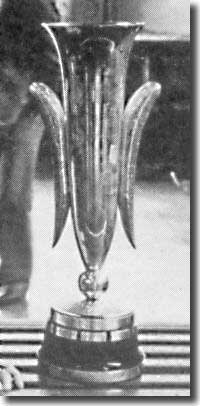 do
not just wish to get into the First Division but to win it and get into
the European Cup.'
do
not just wish to get into the First Division but to win it and get into
the European Cup.'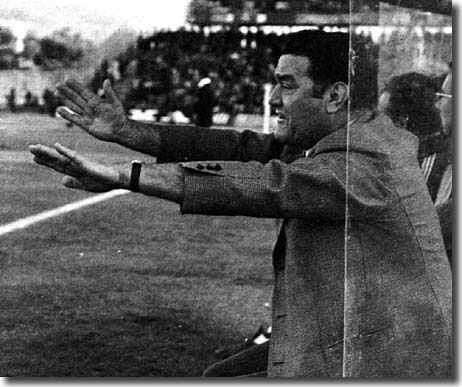 deserted
AC Milan after leading them to a European Cup triumph in 1963 and had
taken up the reins at Torino.
deserted
AC Milan after leading them to a European Cup triumph in 1963 and had
taken up the reins at Torino.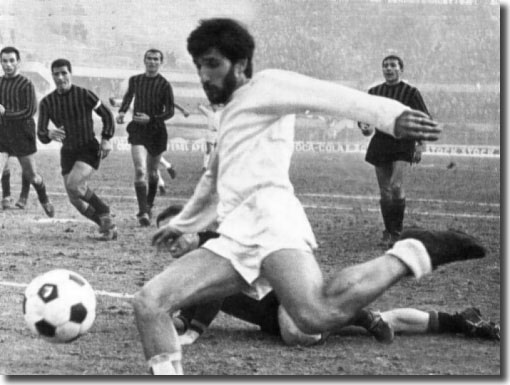 has
a splendid team. They should have scored four or five goals in the first
half.' Some of the wily Italian's comments were made purely for the benefit
of public consumption, and he was confident of recovering the tie at home.
has
a splendid team. They should have scored four or five goals in the first
half.' Some of the wily Italian's comments were made purely for the benefit
of public consumption, and he was confident of recovering the tie at home.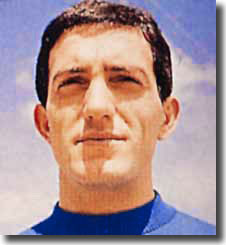 Bobby
Collins wouldn't get up, he must have something broken. I stood over him,
whacking one Italian and punching another to keep them back, until eventually
the referee realised that Bobby must be seriously hurt and called for
a stretcher.'
Bobby
Collins wouldn't get up, he must have something broken. I stood over him,
whacking one Italian and punching another to keep them back, until eventually
the referee realised that Bobby must be seriously hurt and called for
a stretcher.'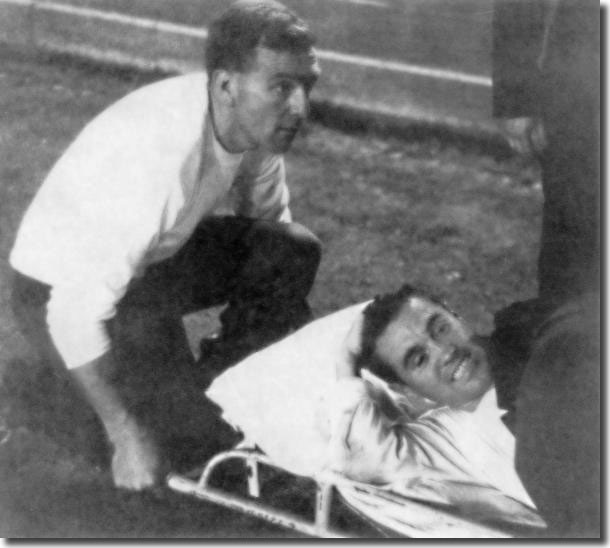 his shot scrape
the post.
his shot scrape
the post.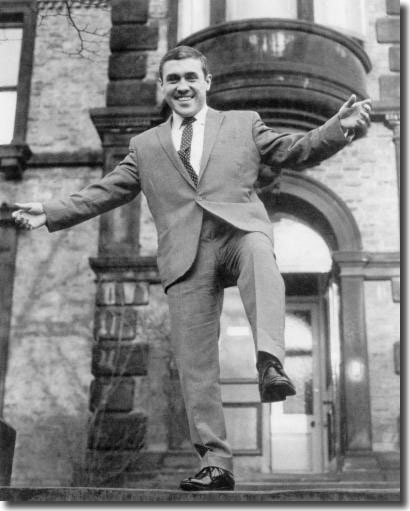 specialised in repairing shattered
limbs. Surrounded by mountains, they had gained a reputation in this field,
having dealt with many ski and mountaineering casualties, They had perfected
techniques for all kinds of fractures. The medical team was headed by
a world-renowned surgeon, Professor Re. I could not have been in better
hands.
specialised in repairing shattered
limbs. Surrounded by mountains, they had gained a reputation in this field,
having dealt with many ski and mountaineering casualties, They had perfected
techniques for all kinds of fractures. The medical team was headed by
a world-renowned surgeon, Professor Re. I could not have been in better
hands.